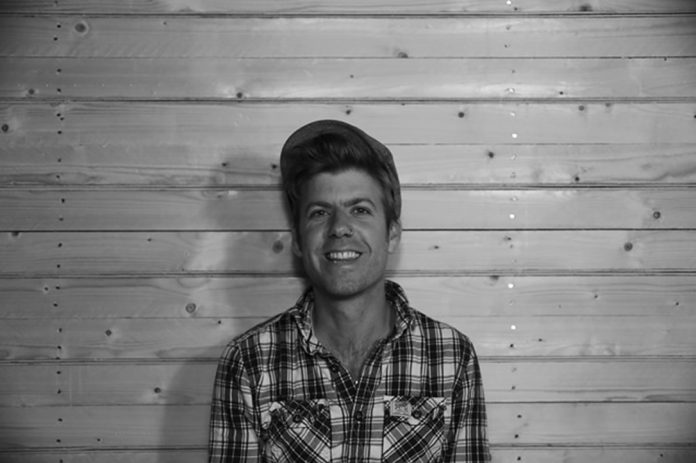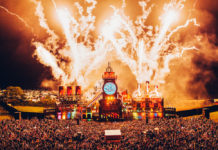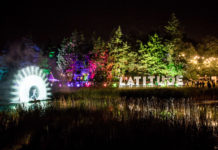Now in it’s ninth year, Boomtown is becoming known as one of the big ones for those that like to take festivaling to its euphoric extremes. From drum and bass, to reggae, to the Speaker’s Corner, the music scene covers all corners of the auditory spectrum – and it’s not just about the sound systems either. Boomtown is renowned for its immersive, interactive storyline, the backstage army that ignites the city, and their dramatic stage designs. With the storyline for the ninth “chapter” released last week, we managed to catch up with co-founder Lak Mitchell to find out some of the backstage technicalities usually left behind the glossy plywood walls.
Where did the inspiration to begin Boomtown come from? What was the original goal? Are you still hitting that goal, or has it evolved?
We grew up in the festival scene and had been running club nights for years, which evolved into putting on our first festival, and planted the seed of inspiration to build it around an actual town. All festivals are like mini towns and villages, with the infrastructure, services and provisions needed behind the scenes, but we wanted to fully explore how far we could take that idea. Nine years later, we have a full blown city of 60,000 people, nine themed areas, incredible stage set designs and hundreds of interactive venues: it’s amazing to see what’s become from a few friends huddled around a makeshift stage in a soggy field, sipping cider and skanking out to ska!
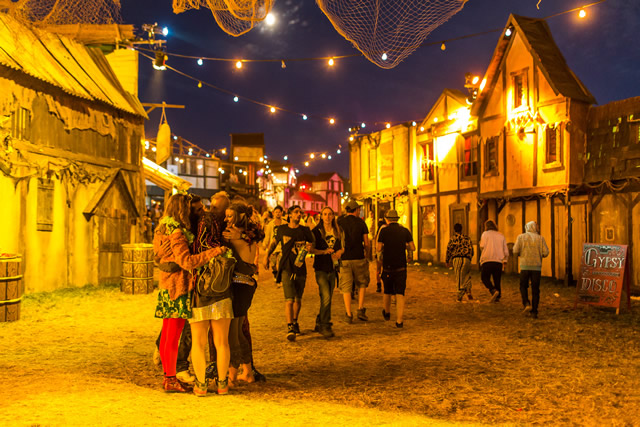
The first thing that hit me when I arrived at Boomtown was total awe at the detail of construction – how long does the preparation take?
The preparation takes all year, if not years! We build on the infrastructure and ideas of every event and sometimes have plans for years ahead, but have to wait for licensing and the storyline to catch up before we can implement them! But, practically, for each festival we start on the concept and planning immediately after one event, and then all build crews and other production teams are working for six months flat out to create the city.
How many people contribute?
We have around 7,000 crew on site to get the festival open to the public.
Wow! How long does it physically take to get Boomtown into action?
In terms of on site build? The bulk of the team are around for two and a half months – six weeks before and a month after.
What are the biggest obstacles to bringing Boomtown to life?
The sheer scale of the project is pretty mind blowing when you take a step back! If we ignore the build and production elements, the biggest obstacles we face these days are the licence and finances. As an independent festival with no large investors, the amount needed to get something like this off the ground is a lot, and there are surprising hidden costs around every corner. For example, Brexit had a huge effect on the artist booking budget – with the pound plummeting and a lot of our acts being international artists, that’s been a pretty big one this year. Sticking to the licence conditions such as sound limitations is also a major objective, and can be pretty tricky to explain to people at the festival when they want the sound systems turned up as loud as possible. Getting the balance between loud enough inside and quiet enough outside is so important, and something we put a huge amount of time and energy into each year.
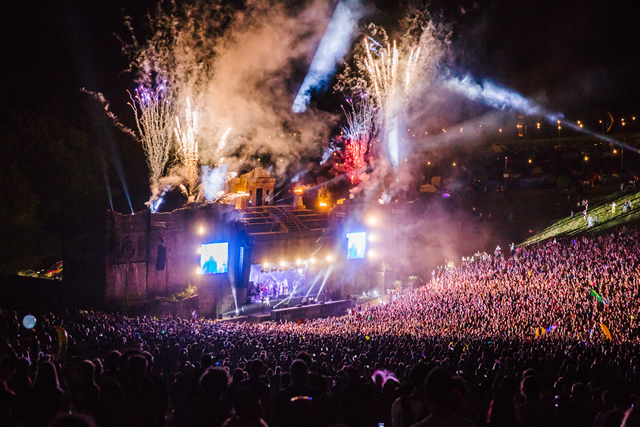
What inspired the different layout this year? Did it have the required effect?
We’ve always wanted to spread the festival out into the natural amphitheatre behind the Lion’s Den in Temple Valley, to make the very most of the amazing location in the South Downs National Park that we are lucky enough to be in – Sector 6 was the perfect stage to fill this spot! Plus we wanted to spread the more bass heavy stages out across the site, so that the people who come mainly for those genres had reason to explore the festival a bit more! We also expanded up and over the top of the hill for the new Whistler’s Green and Kidztown area, which gave a whole new atmosphere to that part of the festival and created an amazing environment of chill out spaces, workshops, crafts and education.
How do you pick the artists, with so many sounds represented? There’s so many stages! Is there a team devoted to each genre, and do you preside over a favourite genre yourself? Is it something you fight about in the office?
Ha, if only you knew the debates in the office! Intense! – Not really. It’s a really collaborative process where we make a wish list about sixteen months before the festival, and then work flat out to lock in as many that are available as possible, whilst maintaining a solid balance of live acts, DJs, and an even spread of genres. The music office team look after the bookings for the main stages, loosely divided up between one booker for the live acts and one for the DJs (although that’s mixed up as well). All the street venues book their own acts.
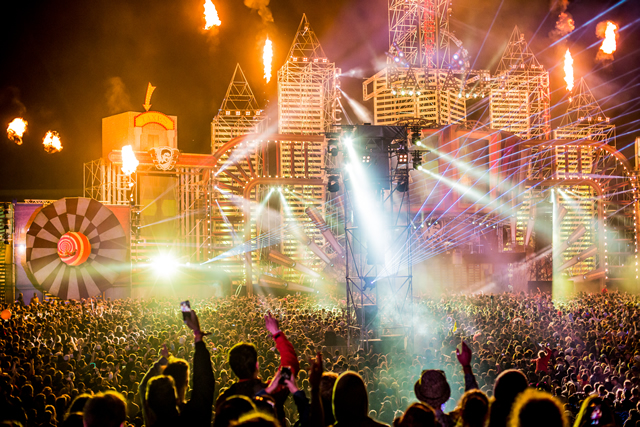
Being in my twenties, when I talk to my peers about Boomtown, drugs inevitably come up. How did you feel hearing about the drug testing initiative at Secret Garden Party last year? Is that something that Boomtown hopes to replicate in future? Obviously, the signs around the site encourage safe drug usage, but how do you work with the police on that?
We are in conversation with the Loop (the company who conducted the front of house drugs testing at SGP), and have been working flat out on our drugs awareness and harm reduction strategy ahead of the 2017 event. Although we have run many drugs campaigns over the years to raise awareness and educate, we feel that a really radical approach, encompassing every sector of the festival, needs to be taken to make any real impact. We know that we need to do everything in our power to keep people safe at, and, hopefully, through solid education, beyond the festival environment. More will be announced on this over the coming months, but the full ‘statement of intent’ can be read here: http://www.boomtownfair.co.uk/news/2017-01-16-drug-awareness/
Biggest achievement for Boomtown this year? And biggest goal for next year?
It felt like people really understood and engaged with the storyline this year. After the past four years of ramping up the level of interactive theatre and adding depth to the story, it was great to see so many people getting involved, and to have it immersed in so many elements of the festival. Another major achievement was the popularity of the Speakers’ Corner talks tent in Whistler’s Green: it’s been a project many of us behind the festival have wanted to see for a few years, and to bring it to life, and for it to be so well received, was really inspiring and something we will build upon in coming years. Our biggest goal for this year’s event is to hopefully make a real impact on the education and awareness of drug and alcohol misuse.
Thank you for your time Lak! To buy tickets and find out more about Boomtown and all the fun to come this year, head to https://festivalmag.com/festivals/boomtown, or watch the 2017 storyline release video below.
